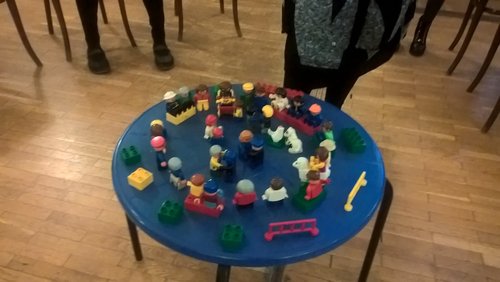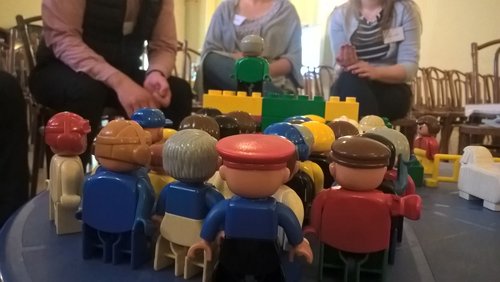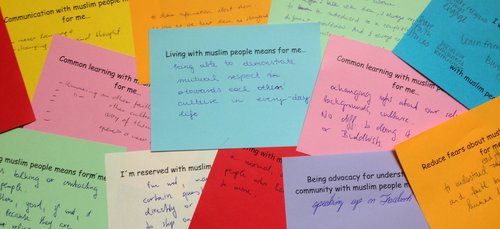Working Among Refugees: Challenges and Opportunities
2017. április 27., csütörtökMartina Wasserloos-Strunk, a German political scientist and member of many WCRC groups, lead participants in Budapest in a seminar about human migration. Participants came from a variety of backgrounds and bonded in a day-long seminar about the challenges and opportunities that come with refugee integration in Europe.
Martina Wasserloos-Strunk, political scientist, member of the Task Force on Migration and Refugee of the European Area of the World Communion of Reformed Churches, held an important seminar in Budapest on April 25th on the topic of human migration. The theme of the seminar, organized by the RCH’s new Unit for Refugee Integration, was, “Escape, Migration, and Challenge,” and took place at St. Columba’s Scottish Mission in Budapest, a joint congregation of the RCH and Church of Scotland.

The seminar gave participants a unique opportunity to discuss the topic of human migration in an intimate setting among professionals in the field. Those in attendance included staff from the RCH’s Ecumenical and Mission offices, Hungarian Reformed Church Aid, the RCH Diaconal Office, Kalunba Ltd. (the RCH’s implementing partner for refugee integration work), as well as members from local RCH congregations in Budapest. The number of participants was capped so that those involved would get the most out of the experience. Participants were a mixture of professionals, interested future volunteers in the field, current volunteers doing this work, as well as other interested parties whose work connects to the overall theme of human migration. The mixture of people meant there were a variety of viewpoints represented during the day, leading to rich and spirited discussions.
Martina shared her expertise and led discussions on topics such as the current situation of refugees in the world, where participants may meet refugees in their daily lives, what information or support would be helpful for the people working with refugees, and what Christian-Muslim cooperation looks like in refugee integration work. Rev. Aaron Stevens, of St. Columba’s, and Kearstin Bailey, the RCH’s Global Mission Intern, were also in attendance and shared their expertise on refugee integration work in the Hungarian context and what the church is currently doing in this field.
For the morning session, participants were asked to think about what they would bring with them if they were forced to flee their homes and a discussion followed about the difficult and broken immigration systems in Europe. Those in attendance continued their discussions over a lunch prepared by a local Bangla family who was helped by Kalunba when they arrived in Hungary a few years ago.

The morning conversations gave the group a good foundation of knowledge, and the discussion after lunch centered around practical matters – like what participants could tangibly do to improve their work with refugees and also what interfaith refugee integration work could look like, based on an example in Germany.
When he spoke about what work with refugees would look like in an ideal world, Rev. Stevens read part of Revelation 7:9 saying that, “there before me was a great multitude that no one could count, from every nation, tribe, people and language, standing before the throne and before the Lamb. They were wearing white robes and were holding palm branches in their hands.” Gréta Pataki, a Hungarian university student at Corvinus University of Budapest studying international relations, said that in her ideal world there would be no hate speech and the European Union would have a unified and compassionate response to the current waves of migration happening. Balázs Ódor, RCH Ecumenical Officer, told the group that he hoped for a world where there was no wasted energy in the field of refugee aid, and that, practically, the church and its affiliates should help to create space for deeper dialogue and reflection about the issues at hand, and then communicate this to the wider public.
Martina also shared her own experiences with the group, as the Head of the Protestant Philippus-Academy, an organization who has recently partnered with IRFAN, a Muslim faith community that does community-based integration for refugees. She showed the participants images from their interfaith events and talked about their language classes with both Muslim and Christian teachers. Martina said that there were many challenges in the work, especially in the beginning, but both parties were committed to the partnership and it has become even stronger now due to these challenges. She then encouraged Christians in Hungary to work together with Muslim communities of faith in deep and meaningful ways, opening up avenues for dialogue and opportunities to make a difference in the world together.

After spening the day in Budapest, Martina departed to Debrecen where she held a seminar there the next day. Following her time in Debrecen, she traveled to the Nyírbátor reception center to see the situation on the ground.
Article by Kearstin Bailey
Contact us
Click here if you are interested in twinning.
Reformed Church in Hungary
Address: H-1146 Budapest, Abonyi utca 21.
PO Box: 1140 Budapest 70, Pf. 5
Email: oikumene@reformatus.hu
English, German and Korean language services in Budapest
Links
Recommended articles
-
Pastoral Letter in the Light of the Pandemic
Bishop Dr. István Szabó sent a pastoral letter of encouragement to the ministers serving in RCH’s congregations, expressing his gratitude for the persistence and creativity of the pastors.
-
RCH Joins in Pope's Call for Prayer
RCH published the call on congregations to join the initiative of Pope Francis, supported by ecumenical organisations, to unite in praying the Lord’s Prayer on Wednesday, 25 March, at noon.
-
English Speaking Worship Services Online
Each Sunday at 11 AM (CET) the St. Columba's Church of Scotland in Budapest, the international community of RCH invites you to join the worpship service on its facebook page.
-
Test of Humanity and Companionship
Reformatus.hu asked Dr. György Velkey, Director General of the Bethesda Children’s Hospital of RCH about the challenges of health care workers and ways of prevention against the pandemic.
-
All Church Events Suspended
In light of the coronavirus the Presidium of RCH requested congregations to suspend all church events with immediate effect. Beside restrictions, it calls for prayer, sobriety and responsibility.











